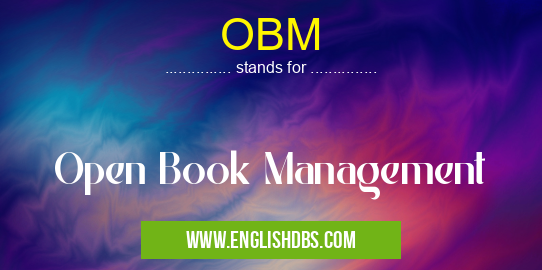What does OBM mean in ACCOUNTING
Open Book Management (OBM) is a management philosophy and system of processes that seek to promote increased employee engagement through financial transparency. OBM encourages employees in an organization to participate in decision-making by educating them on the company's financials and performance.

OBM meaning in Accounting in Business
OBM mostly used in an acronym Accounting in Category Business that means Open Book Management
Shorthand: OBM,
Full Form: Open Book Management
For more information of "Open Book Management", see the section below.
» Business » Accounting
Essential Questions and Answers on Open Book Management in "BUSINESS»ACCOUNTING"
What is Open Book Management?
Open Book Management (OBM) is a management philosophy and system of processes that seek to promote increased employee engagement through financial transparency.
What objectives does Open Book Management seek to achieve?
OBM seeks to achieve increased employee engagement and involvement in decision-making within an organization. By ensuring employees are aware of the company's financials, they can have greater influence on the direction it takes.
Who can benefit from Open Book Management?
Both employers and employees stand to benefit from Open Book Management. Employers are able to draw on employees' knowledge of their work area when making decisions, while employees gain a greater understanding of how their work impacts the business's overall performance.
How does Open Book Management enhance engagement?
By increasing transparency and sharing key information with all team members, OBM helps to foster trust between management and staff as well as motivating employees by allowing them to see results for their hard work. This ultimately increases engagement within the workplace.
Are there any potential drawbacks associated with using Open Book Management?
One potential issue with OBM is that it requires significant investment from all parties involved — managers, who must provide training; accountants or CFOs, who must track metrics; and teams who must learn new data analysis skills. Additionally, it can be difficult if not impossible for smaller businesses who lack resources or funds required for this system.
Final Words:
In conclusion, Open Book Management offers many advantages such as increased engagement and involvement in decision-making among employees while helping employers better understand the impact individual actions have on business performance. However, implementing OBM requires adequate resources which may not be available in smaller businesses.
